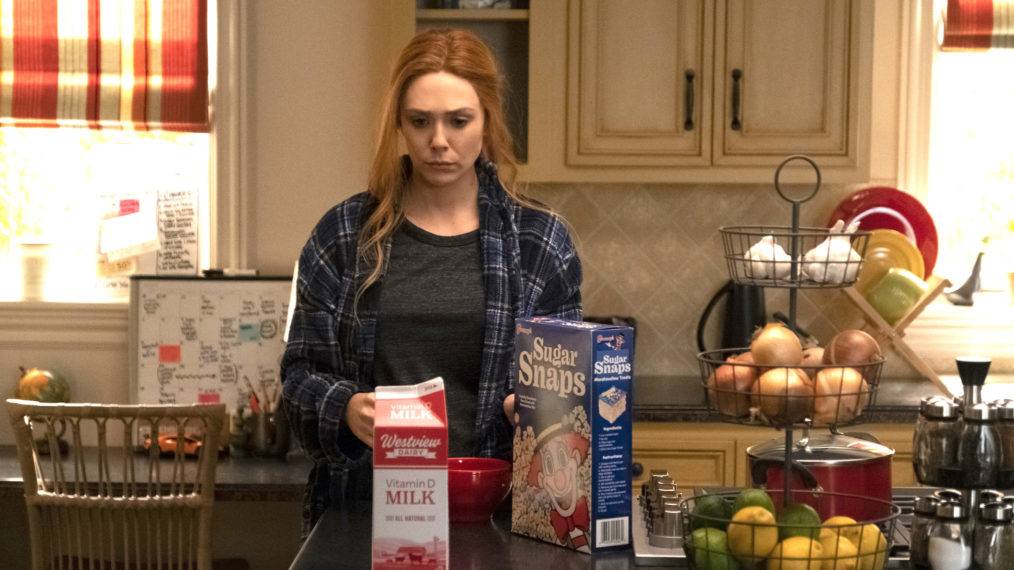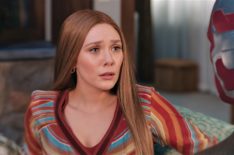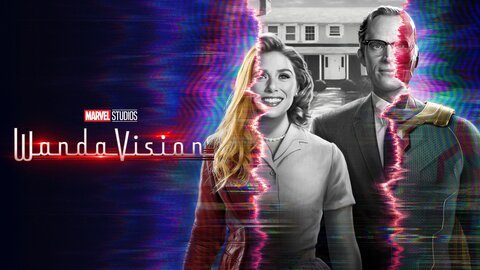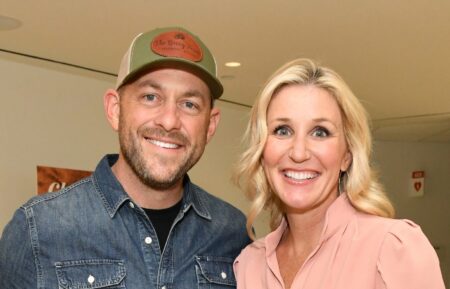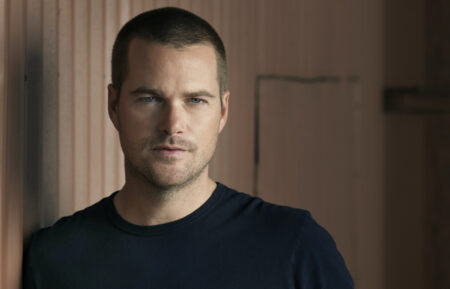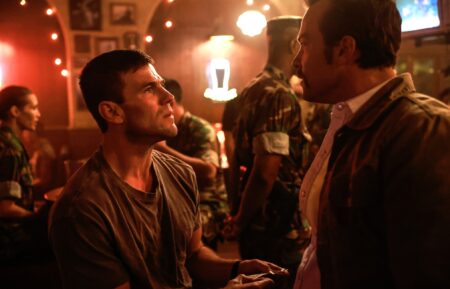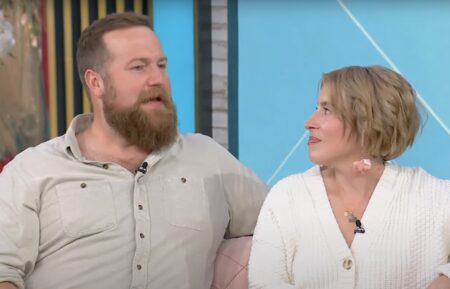How ‘WandaVision’ Uses the Stages of Grief to Understand Wanda’s Mental State
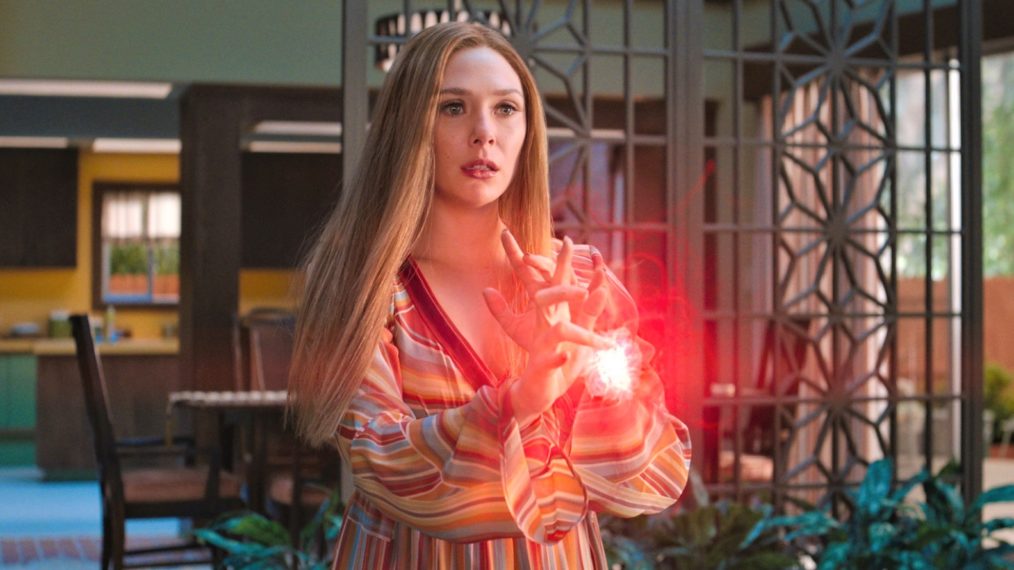
Spoiler Alert
[Warning: The below contains MAJOR spoilers for Season 1 of WandaVision.]
WandaVision has been a wacky ride through classic TV sitcoms, which serve as as the backdrop for a “perfect” suburban life. But Wanda’s (Elizabeth Olsen) make-believe world has been unraveling.
While viewers familiar with the Avenger heroes (Wanda and her husband, Vision, played by Paul Bettany) have been confused about what, exactly, has been going on in the town of Westview, the truth about their lives is getting clearer with each episode. And now, the latest episode not only doubles down on Westview having been taken over by Wanda, but shows that she and Vision are far from the only super powers in it.
But a question, tantalizingly close to being answered, remains: Why did Wanda retreat to this sitcom bubble in the first place? The guess, of course, is that it has to do with Thanos’ killing of Vision, which is the second time he dies; the first is at the hands of Wanda herself, but only in an attempt to stop Thanos.
Wanda, it seems, is grieving his loss, and in a very big way. And the signs are certainly there as she cycles through the stages of grief: denial, anger, bargaining, depression, and acceptance. S.W.O.R.D. agent Monica Rambeau (Teyonah Parris) suggests as much when she tells her colleagues that what she felt inside of Westview was grief and pain and loss, all things that Wanda’s dealing with.
As Wanda’s version of Westview crumbles and she encounters new threats, her grief continues to follow its course. Below, we break down the clear signs that Wanda is dealing with nearly all of the stages of loss, both through her own actions, and those of Westview’s other characters.
Denial
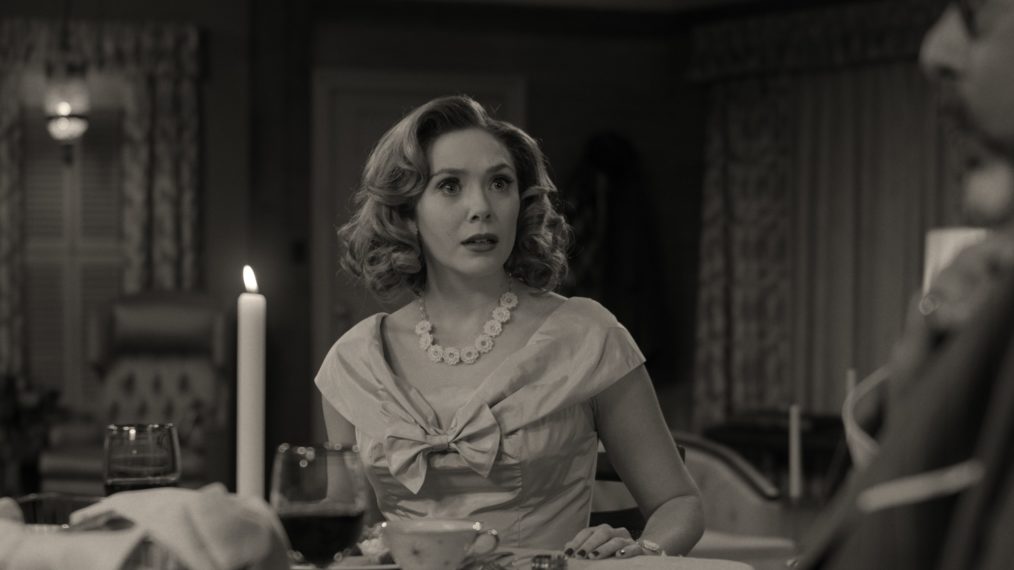
Disney+/Marvel
In the show’s first outing, Wanda and Vision’s black-and-white dinner party is fairly uneventful, exploring the stereotypical ’50s TV tropes. But the most sobering moment comes when their guest, Mr. Hart (Fred Melamed) begins choking on the meal. The man’s wife (played by Debra Jo Rupp) seems to think he’s joking and lets him struggle in a mirroring of Wanda’s denial. Eventually Vision intervenes and saves the man.
In Episode 2, “Don’t Touch That Dial,” Wanda’s fantasy is threatened in a variety of ways. For instance, color occasionally permeates the black-and-white landscape. And when Wanda sees a man emerge from a manhole (it’s revealed in Episode 4 it’s a S.W.O.R.D. operative) she utters the word “no,” before the setting rewinds and resets to the prior scene.
In Episode 3, “Now in Color,” Wanda and Vision are, the first time, no longer on the same page about their seemingly idyllic life. Vision speaks up about the weird things that are happening, but when he tells his now expectant wife, “I think something’s wrong here,” the scene is cut and Vision comes back in a different spot, redoing the scene but in a less disconcerting way.
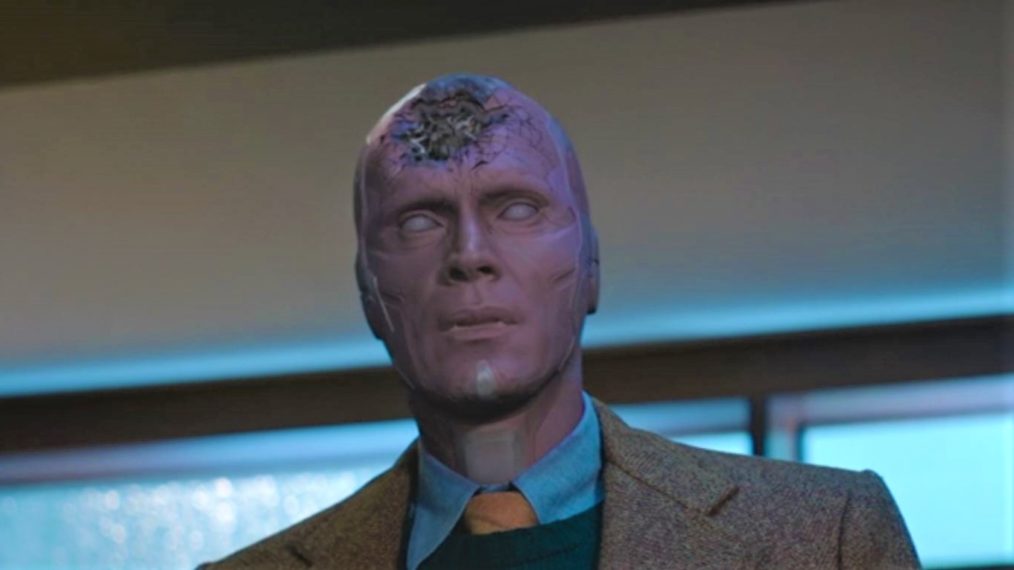
Disney+/Marvel
This switch up suggests that the more people come to terms with the strangeness of Westview’s so-called reality, the more detrimental it is to Wanda’s desire to disappear inside of it. When Episode 4 rolls around, their ’70s life picks up where things left off, but Wanda’s trauma is now manifesting within the fantasy. While speaking to Vision, she turns to face him and finds an animated corpse, his head bashed in from where Thanos plucked the mind stone from his forehead.
After looking away and turning back to Vision, his face returns to normal, but this brief flash suggests that Wanda’s attempt to deny reality is further fraying. And in Episode 5, when Vision confronts Wanda about her control over Westview, she brushes him off, indicating she has some level of control but adding that she’s not entirely sure how some things are happening. “I don’t know how any of this started in the first place,” Wanda tells him. To an extent this might be true, but Wanda’s continued manipulation of Westview says otherwise.
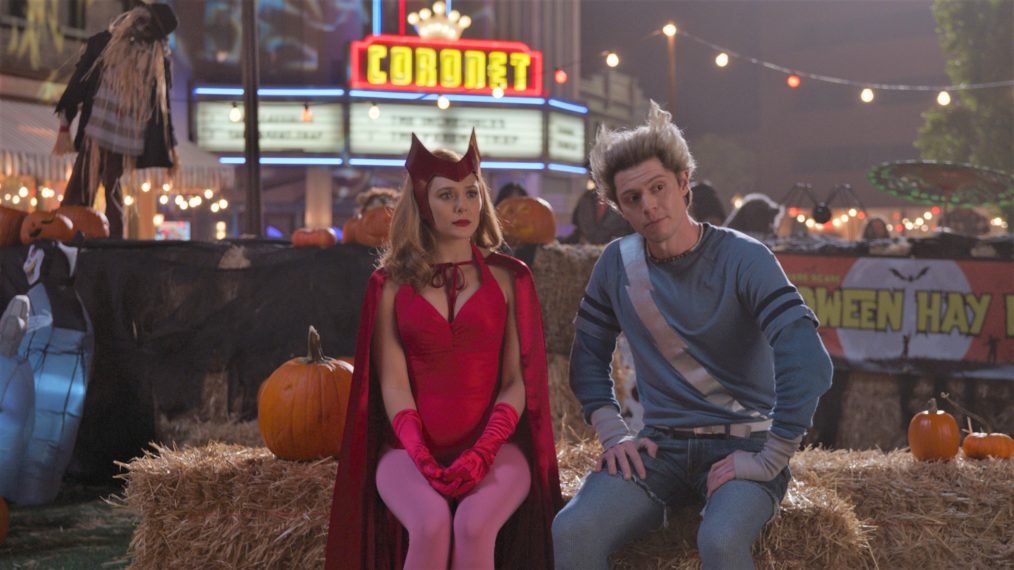
Disney+/Marvel
When Wanda’s brother “Pietro” (played by Evan Peters) shows up at their door, she embraces denial once more by accepting the stranger in their home. This Pietro looks nothing like Wanda’s brother (played by Aaron Taylor Johnson), but could be a sign of merging realities considering Peters portrayed Quicksilver/Peter Maximoff in the X-Men movies.
During Pietro’s stay with Wanda and Vision, he joins his sis at a Halloween celebration in the center of town and, just like with her husband, Wanda sees a bullet-ridden version of Pietro sitting beside her. She quickly looks away.
Anger
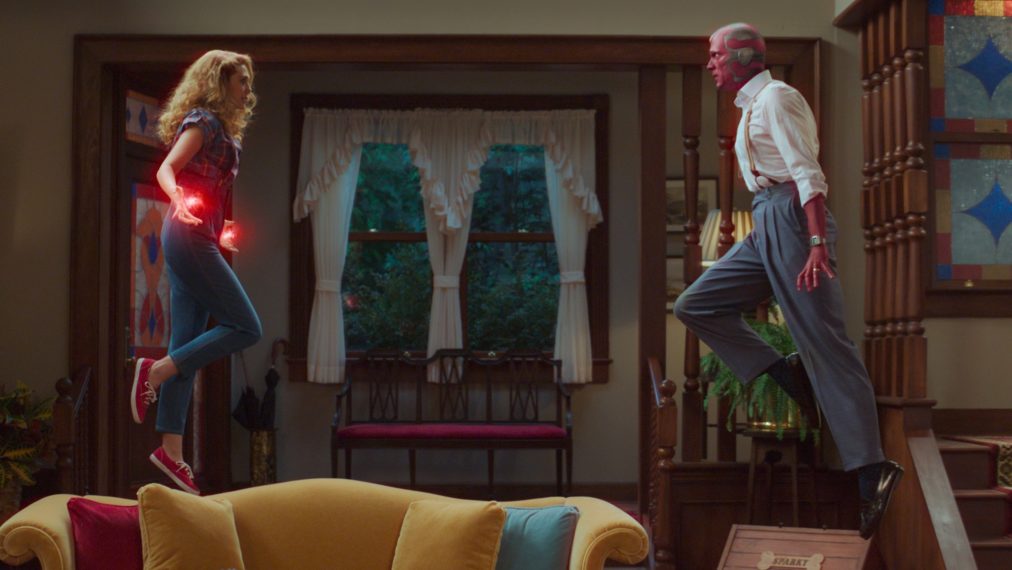
Disney+/Marvel
In Episode 4, when Wanda pushes “Geraldine” — who is really Monica Rambeau — out of Westview, it’s clear her anger is surfacing. The trouble begins when Wanda mentions her twin brother Pietro, who had died, and Geraldine says, “he was killed by Ultron, wasn’t he?” Monica realizes her mistake when Wanda asks for her to repeat the comment and asks who she really is.
But Monica can barely give a half-decent answer, resulting in Wanda’s new aggression. So, she blasts the threat out of her house. The more S.W.O.R.D. and the FBI interfere, the angrier she gets. When S.W.O.R.D.’s Director Hayward (Josh Stamberg) sends in a drone to communicate and target Wanda, she’s triggered to the point of exiting the “hex,” as Darcy Lewis (Kat Dennings) calls it.
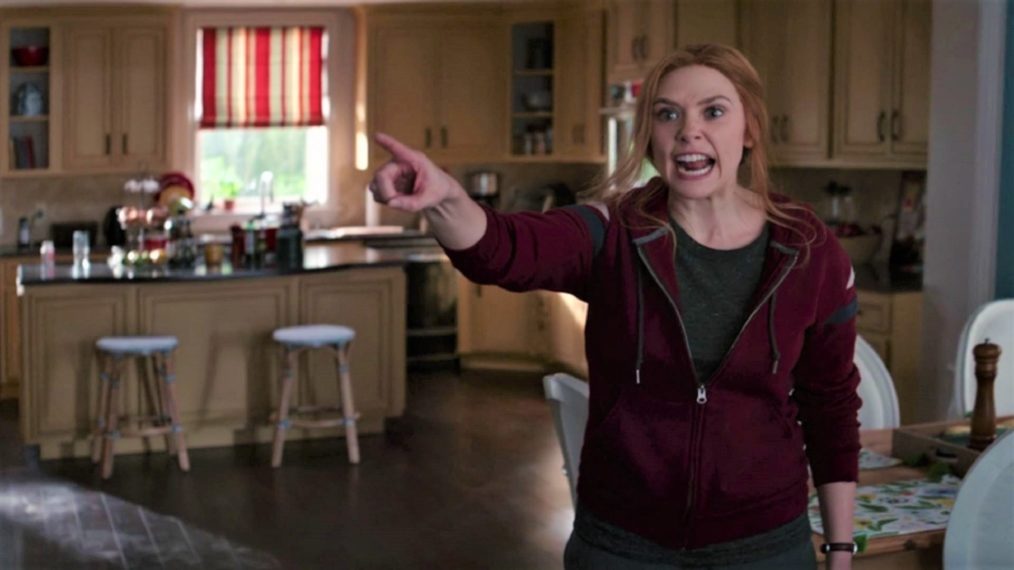
Disney+/Marvel
In Episode 6, moments after she sees this corpse version of her “brother,” Wanda discovers that Vision is in trouble. Pietro makes a comment about how her dead husband can’t die twice, and Wanda blasts him across Westview’s town center in rage over the remark.
When Monica breaks through Westview’s border again in Episode 7, she’s changed permanently, gaining some sort of powers on her reentry. Running to Wanda’s house, she tries to help her, but is met with pure anger as the Scarlet Witch accuses her of wanting to hurt her family. Monica attempts to reassure her that she had nothing to do with Hayward’s drone being armed, but this doesn’t satisfy Wanda. Monica has guilt by association in Wanda’s eyes, making her a threat to the world she’s tried to maintain.
Bargaining
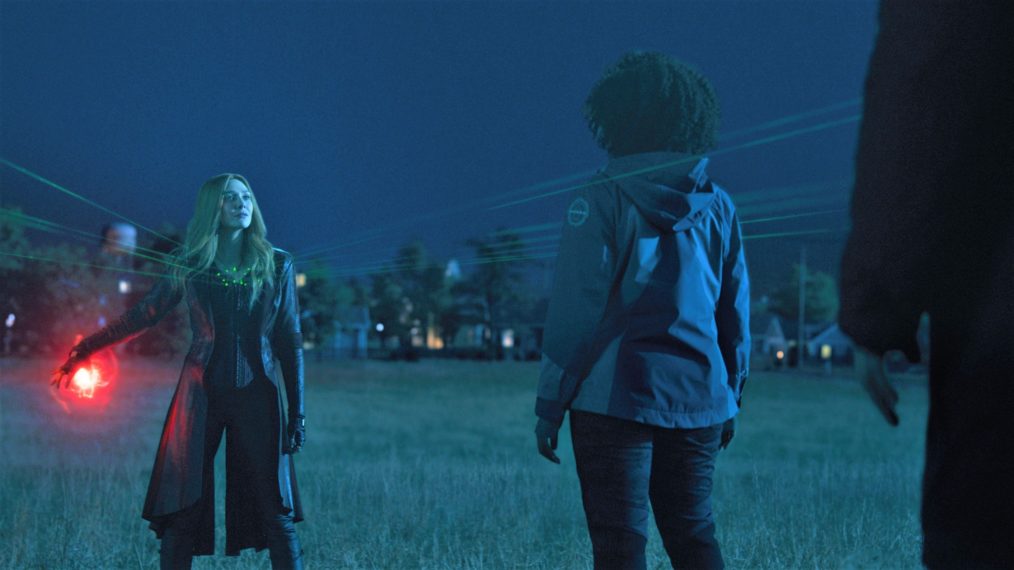
Disney+/Marvel
Bargaining starts a little early, in the fifth episode, when Wanda exits the altered Westview to return S.W.O.R.D.’s armed drone, and tells them to stay away. “This will be your only warning. Stay out of my home. You don’t bother me, I won’t bother you,” Wanda tells Hayward.
The exchange is an admission of her role in taking over Westview, but also makes it clear that she could cause more damage if they don’t cooperate with her. She basically tells Monica the same thing in Episode 7; when being led away from her home, she tells the S.W.O.R.D. agent, “Don’t make me hurt you.”
Depression
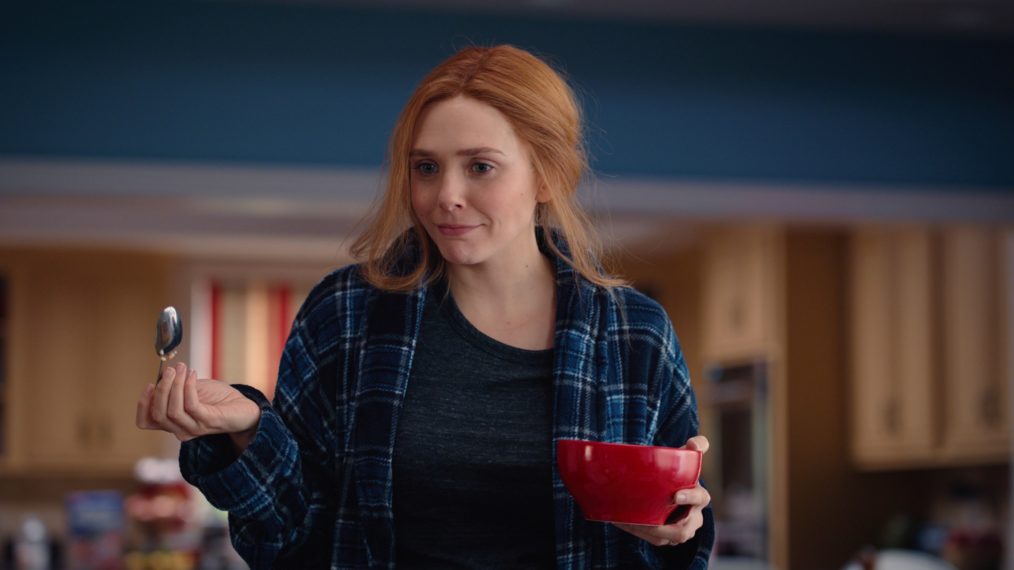
Disney+/Marvel
In Episode 7, she’s full-on depressed. She begins the episode under the covers of her bed and tries to justify her recent expansion of Westview’s borders, tries to ignore her kids, and appears disheveled in frumpy clothes, and is barely struggling to control her constantly changing environment. Wanda’s out of wack and Vision’s notable absence isn’t helping her morale.
When the person behind her Modern Family-esque sitcom lens — breaking the fourth wall — asks if she deserves things to be falling apart, Wanda says, “You’re not supposed to talk,” right before a commercial for, yes, an anti-depressant named Nexus is advertised.
Acceptance?
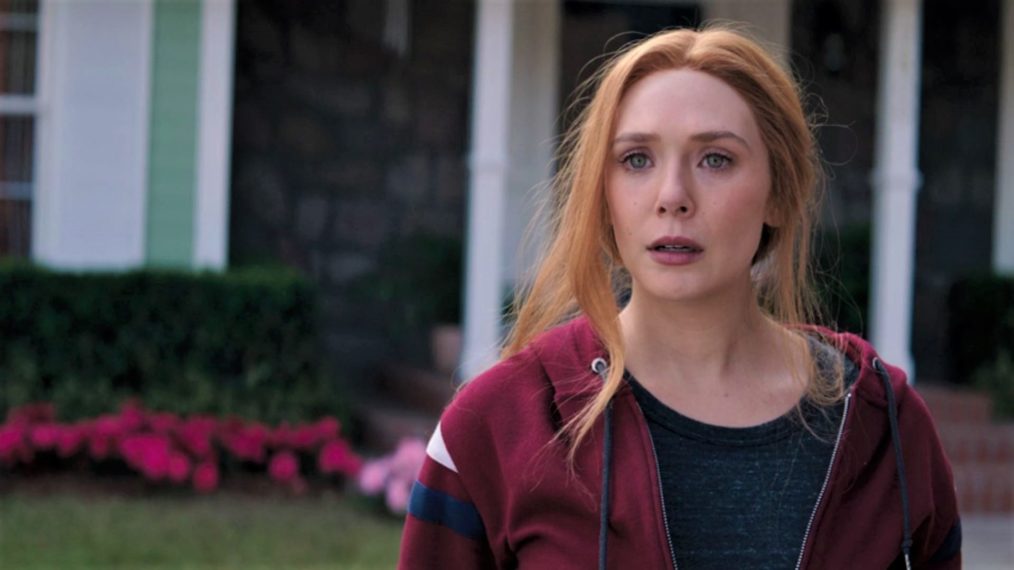
Disney+/Marvel
During Monica’s confrontation with Wanda in Episode 7, the agent begs her to not let Hayward make her the villain. Wanda’s answer to this is the closest she has come to acceptance so far: “Maybe I already am,” Wanda says of being the bad guy in this equation.
Could more acceptance be on the horizon?
WandaVision, New Episodes, Streaming Fridays, Disney+

